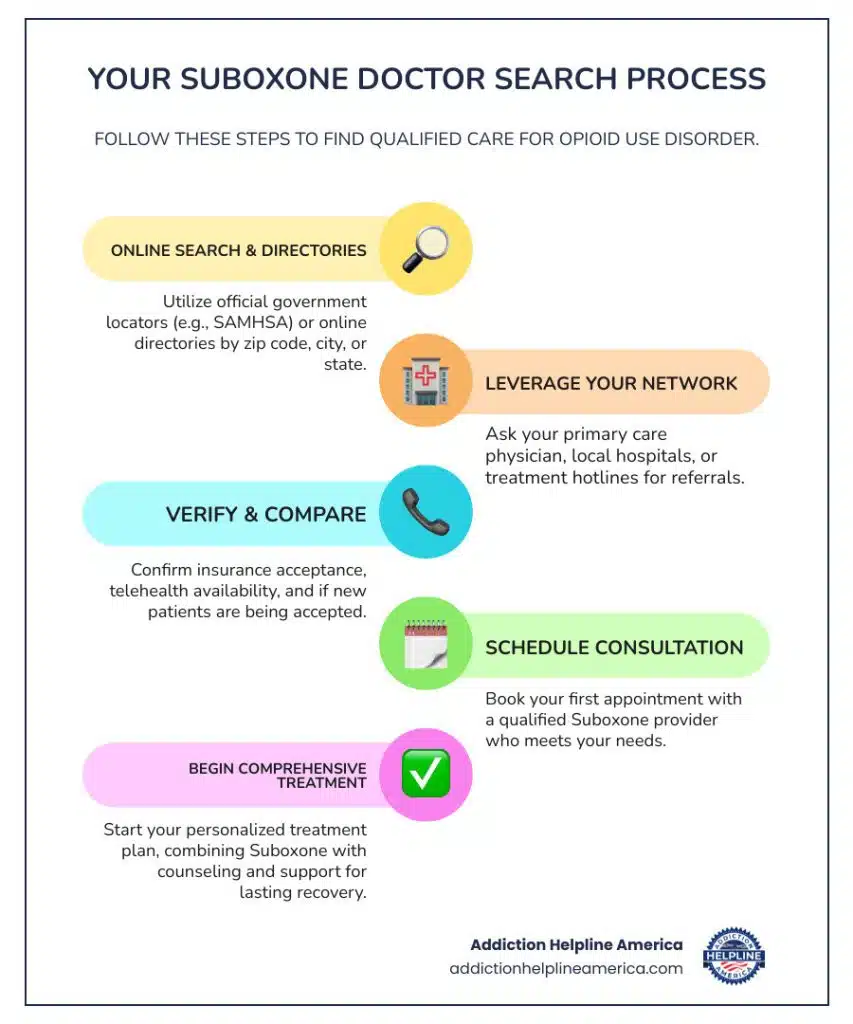
A Suboxone doctor search can feel overwhelming when you’re struggling with opioid addiction, but knowing where to look makes all the difference. Here are the fastest ways to find qualified providers:
Quick Search Methods:
- Use SAMHSA’s Buprenorphine Practitioner Locator (official government directory)
- Search online directories by zip code, city, or state
- Contact your primary care doctor for referrals
- Call treatment hotlines for immediate guidance
- Ask at local hospitals or emergency rooms
What to Look For:
- Doctors accepting new patients
- Insurance acceptance (Medicaid, Medicare, private)
- Telehealth availability for convenience
- Comprehensive treatment plans including counseling
Taking the first step to get help for opioid use disorder is incredibly brave. As one expert guide notes: “Taking the first step to get help for opioid use disorder (OUD) is a very brave and significant step.”
Suboxone combines two medications – buprenorphine to reduce cravings and withdrawal symptoms, and naloxone to prevent misuse. This FDA-approved treatment has helped thousands of people reclaim their lives when combined with counseling and support.
At Addiction Helpline America, we’ve guided countless individuals through their Suboxone doctor search to connect them with qualified providers who offer compassionate, evidence-based care. Our team understands that finding the right doctor is crucial for successful recovery, and we’re here to help you steer this important journey.

What is Suboxone and How Does It Help?
When you’re starting your Suboxone doctor search, it helps to understand what makes this medication so effective for treating opioid use disorder. Suboxone isn’t just another pill – it’s a carefully designed treatment that can truly change your life when used as part of a complete recovery plan.
Suboxone combines two powerful ingredients that work together to help you break free from opioid addiction. The first is buprenorphine, which acts like a gentle helper for your brain. Instead of giving you the intense high that other opioids provide, buprenorphine works more like a dimmer switch – it satisfies your brain’s craving for opioids without the dangerous effects.
This means buprenorphine reduces those overwhelming cravings that make recovery feel impossible. It also eases withdrawal symptoms, so you don’t have to suffer through the painful process of detox. Many people say this is what finally allowed them to focus on getting better instead of just surviving each day.
The second ingredient is naloxone, which serves as a built-in safety feature. If someone tries to crush and inject Suboxone to get high, the naloxone kicks in and causes immediate withdrawal symptoms. It’s not there to punish you – it’s there to protect you from dangerous misuse.
Medical supervision is absolutely essential when taking Suboxone. Your brain and body are going through significant changes, and having an expert guide you through this process makes all the difference. There’s also something called precipitated withdrawal – if you take Suboxone too soon after using other opioids, you could experience very intense withdrawal symptoms. A qualified doctor knows exactly how to help you avoid this.
The Benefits of Medically Supervised Treatment
Finding the right doctor during your Suboxone doctor search opens the door to so much more than just getting a prescription. You’re getting a partner in your recovery who understands that everyone’s journey is different.
Your doctor will create a personalized care plan that fits your specific situation. They’ll consider your history with opioids, your health conditions, and what you hope to achieve in recovery. This isn’t cookie-cutter treatment – it’s designed just for you.
The safe induction phase is where medical expertise really matters. Starting Suboxone requires perfect timing. Your doctor will make sure you’re in the right state of withdrawal before giving you that first dose, protecting you from precipitated withdrawal. They’ll be there to guide you through what can feel like a scary transition.
Adjusting your dosage is an ongoing process that requires medical knowledge. Too little, and you’ll still struggle with cravings. Too much, and you might experience unnecessary side effects. Your doctor will work with you to find that sweet spot where you feel stable and comfortable.
Integrated support is what makes Suboxone treatment truly effective. The medication handles the physical part of addiction, but you’ll also need help with the emotional and psychological aspects. Your doctor can connect you with counseling services, support groups, and therapy that addresses any mental health issues you’re facing alongside addiction.
Your risk of relapse drops significantly when you have proper medical oversight. You’re not trying to figure this out alone – you have a professional monitoring your progress and adjusting your treatment as needed.
Most importantly, Suboxone helps you regain stability and function in your daily life. When you’re not constantly fighting cravings or feeling sick from withdrawal, you can start rebuilding relationships, returning to work, and refinding who you are beyond addiction. That’s the real goal of treatment – getting your life back.
A Step-by-Step Guide to Your Suboxone Doctor Search

Starting your Suboxone doctor search is one of the most important steps you can take toward recovery. It shows you’re ready to take control and actively seek the help you deserve. While finding the right provider might feel overwhelming at first, there are several clear paths that can lead you to the perfect fit for your needs.
The good news is that you have more options today than ever before. Between online tools and your local community connections, there are multiple ways to find qualified Suboxone doctors who can guide you through your recovery journey.
Using Online Tools for Your Suboxone Doctor Search
The internet has made finding healthcare providers easier than ever. When you’re ready to begin your Suboxone doctor search, online resources can quickly connect you with qualified providers in your area.
Start with dedicated search platforms that are designed specifically to help you find Suboxone doctors. At Addiction Helpline America, we’ve created our confidential search tool to make this process as simple as possible. You can search by zip code, city, or state to find providers near you. Many platforms also let you filter results based on what matters most to you – things like accepted insurance, office hours, and doctor credentials.
Government directories offer another reliable option. The Substance Abuse and Mental Health Services Administration (SAMHSA) maintains official, up-to-date directories that are incredibly valuable. Their Buprenorphine Practitioner Locator helps you find doctors authorized to prescribe buprenorphine. You can also explore their Opioid Treatment Program Directory for treatment centers, or use their broader search tool at FindTreatment.gov which lets you filter by payment methods like Medicaid and Medicare.
Telehealth options have completely changed how we access healthcare, and Suboxone treatment is no exception. Many providers now offer virtual appointments, which means you can connect with a qualified doctor from your own home. This is especially helpful if you live in a rural area, have transportation challenges, or need the flexibility to balance recovery with work or family responsibilities. When searching online, look for providers who clearly state they offer telemedicine appointments or online care in your state.
Leveraging Your Local Community and Healthcare Network
Sometimes the most direct path to finding help comes from the people and institutions you already know and trust in your community.
Your primary care physician can be an excellent starting point. Your family doctor knows your medical history and often has connections with local specialists who treat opioid use disorder. Don’t hesitate to have an honest conversation with them about your needs – they’re there to help, not judge.
Hospital and emergency room staff can provide valuable referrals if you’ve had an opioid-related emergency or find yourself seeking help in a crisis situation. These healthcare professionals work with addiction cases regularly and often have comprehensive lists of local Suboxone prescribers and treatment centers.
Local mental health clinics and addiction treatment centers are specifically designed to offer comprehensive addiction care. Many have Suboxone doctors on staff or maintain trusted networks of providers they regularly refer to. These facilities understand the full scope of addiction treatment and can often provide integrated services beyond just medication.
Support group members can offer a unique perspective based on personal experience. People in recovery support groups like Narcotics Anonymous or other local meetings often have knowledge of doctors and clinics in your area. While recommendations from peers shouldn’t be your only factor, they can provide valuable insights about what to expect from different providers.
The key is being proactive in your search and exploring multiple pathways. What works best for one person might not be the ideal fit for another, so don’t be afraid to reach out through several channels as you work to find the right provider for your recovery journey.
Evaluating and Comparing Suboxone Doctors

Now that you’ve found potential Suboxone doctors, it’s time for the important work of comparing them. Think of this as your due diligence phase – you’re not just picking any doctor, you’re choosing a partner who’ll walk alongside you on your recovery journey.
Making an informed choice means finding someone who truly understands your needs. You want a provider who offers quality care at a price you can manage, in a setting where you feel comfortable and supported.
Key Factors in Your Suboxone Doctor Search
When you call potential providers, having the right questions ready makes all the difference. These conversations help you understand what each doctor offers and whether they’re the right fit for you.
Start by asking “Are you accepting new patients?” This might seem obvious, but some doctors have waiting lists. You need someone who can see you soon, especially if you’re struggling with withdrawal symptoms.
Next, inquire about their credentials and experience with opioid use disorder. Suboxone doctors need special training and a DEA waiver to prescribe buprenorphine. Don’t hesitate to ask about their background – a good doctor will be happy to share their qualifications. Nurse practitioners and physician assistants can also prescribe Suboxone in many areas, which often means more available appointments.
Telehealth availability has become a game-changer for many people. If you live in a rural area, have transportation challenges, or need flexible scheduling, virtual appointments might be perfect for your situation.
Ask about their full treatment approach beyond medication. The most effective Suboxone doctor search leads you to providers who understand that medication works best alongside counseling and therapy. A quality doctor will either offer these services directly or connect you with trusted therapists and support groups.
Insurance questions are crucial. Be specific when asking “What insurance do you accept?” Many providers work with Medicaid, Medicare, and private insurance, but it’s always best to confirm your specific plan is covered.
If money is tight, don’t be shy about asking if they offer sliding scale fees or payment plans. Many compassionate providers work with patients to make treatment affordable.
Finally, understand the typical frequency of appointments. Early in treatment, you might see your doctor weekly, then move to monthly visits as you stabilize. Knowing this helps you plan your schedule and budget.
Understanding Treatment Costs and Insurance
Money worries shouldn’t keep you from getting help, but understanding the costs upfront prevents surprises later. Let’s break down what you might expect to pay.
Verifying your insurance coverage should be your first step. Call your insurance company directly or ask the clinic’s staff to check your benefits. Most Suboxone doctors accept a wide range of insurance plans, including government programs like Medicaid and Medicare. Some clinics even offer online forms to verify your coverage, making the process easier.
Even with insurance, you’ll likely have co-pays for each visit and annual deductibles to consider. These are the amounts you pay even when insurance covers the rest.
If you’re paying out of pocket, doctor visits typically cost between $100-$300 per session. This varies by location and provider, so don’t hesitate to ask for quotes when you’re calling around.
The Suboxone medication itself also has costs. For example, an 8mg prescription might run about $240 per month. However, there are ways to reduce these costs through manufacturer coupons, patient assistance programs, or mail-order pharmacies. Ask if your doctor works with services that offer discounted medication delivery.
For those without insurance, many providers offer self-pay rates, payment plans, or sliding scale fees based on your income. Some clinics will provide upfront quotes to help you compare affordability across different providers.
Discussing money might feel uncomfortable, but transparency about costs helps you make the best decision for both your health and your wallet. A good provider wants to work with you to make treatment accessible, not create financial stress that could interfere with your recovery.
Your First Steps: Appointments and Treatment

Congratulations! You’ve completed your Suboxone doctor search and chosen a provider. Now comes the exciting part – actually starting treatment. This moment marks the beginning of your recovery journey, and preparing for what lies ahead can help ease any nerves you might have.
Taking this step shows incredible courage. You’re not just scheduling an appointment; you’re actively choosing a healthier future. Let’s walk through what you can expect as you move from searching to actually receiving care.
In-Person vs. Telemedicine Appointments
One of the first decisions you’ll make is whether to meet your doctor face-to-face or through a screen. Both options have real advantages, and many doctors offer both to give you flexibility.
Telehealth appointments have become incredibly popular, and for good reason. You can meet with your doctor from your living room, wearing comfortable clothes, without worrying about traffic or finding parking. This convenience is especially helpful if you live in a rural area where Suboxone doctors might be hours away.
The technology is pretty straightforward. You’ll join a secure video call with your doctor, just like video chatting with family. Your prescription gets sent electronically to your pharmacy, so you don’t have to make an extra trip. Many online clinics also offer 24/7 chat support for questions between appointments and make it easy to request medication refills.
The main thing you need is reliable internet access and a private space where you can speak openly. Nothing’s more frustrating than a frozen video call when you’re trying to discuss something important.
In-person visits still have their place, especially during those early appointments. Some people find it easier to build trust when they can shake their doctor’s hand and read their body language. Your doctor can also do a more thorough physical exam if needed.
The choice really comes down to what feels right for you. Some people start with in-person visits and switch to telehealth once they’re comfortable, while others prefer the convenience of virtual appointments from day one.
What to Expect During Your First Appointment
Your first appointment is where everything comes together. It’s part medical evaluation, part getting-to-know-you conversation, and part planning session for your recovery.
Your doctor will want to understand your complete medical picture. They’ll ask about any health conditions you have, medications you’re taking, and previous treatment attempts. This isn’t about judgment – it’s about making sure Suboxone is safe and effective for you.
The conversation about your substance use history is crucial, and honesty is your best friend here. Your doctor needs to know what opioids you’ve been using, how much, and for how long. They’ll also ask about your last use, which is especially important for timing your first Suboxone dose safely.
Here’s something really important: you need to be in mild-to-moderate withdrawal before taking your first Suboxone dose. Taking it too early can trigger something called precipitated withdrawal, which feels terrible. Your doctor will check your withdrawal symptoms and guide you on the perfect timing.
Together, you’ll create a treatment plan that fits your life. This includes your Suboxone prescription, but also recommendations for counseling, support groups, or other services that can strengthen your recovery. Think of your doctor as a guide who’s walked this path with many people before you.
If everything checks out during your assessment, you’ll likely walk away (or log off) with your first prescription in hand. That’s a pretty amazing feeling – knowing you’re taking concrete action toward recovery.
How Long Does Suboxone Treatment Last?
This is probably one of the most common questions people have, and the honest answer is: it depends entirely on you. Recovery is a journey, not a race, and there’s no finish line you have to cross by a certain date.
Your treatment typically starts with an induction phase lasting a few days to a week. During this time, your doctor finds the right dose to manage your withdrawal symptoms and cravings without side effects. You might have more frequent check-ins during this period.
The stabilization phase can last months or even years. This is when Suboxone does its job – keeping cravings at bay and withdrawal symptoms away so you can focus on rebuilding your life. You’ll have time for counseling, repairing relationships, and addressing whatever led to your addiction in the first place.
Some people stay on Suboxone long-term as maintenance medication, similar to how someone with diabetes takes insulin. Others eventually work with their doctor on a gradual tapering process once they’ve built a strong foundation in recovery.
The key is ongoing evaluation with your doctor. They’ll regularly check how you’re doing, adjust your dose if needed, and help you make decisions about the next steps in your treatment. Some people need Suboxone for a few months, others for several years. Both paths are completely valid.
What matters most is that you’re getting the support you need for as long as you need it. Your doctor is there to guide you through each phase, ensuring your treatment supports your long-term recovery goals.
Frequently Asked Questions about Finding Suboxone Treatment
When you’re navigating your Suboxone doctor search, it’s completely normal to have questions. We’ve helped thousands of people through this process, and these are some of the most common concerns we hear.
What is the difference between a Suboxone doctor and a Suboxone clinic?
Think of it this way: a Suboxone doctor is like having a personal guide for your recovery journey. This individual healthcare professional—whether they’re a Medical Doctor (MD), Doctor of Osteopathic Medicine (DO), Nurse Practitioner (NP), or Physician Assistant (PA)—has completed specialized training and obtained the necessary DEA waiver to prescribe buprenorphine for opioid use disorder. They’ll manage your medication, monitor your progress, and often provide counseling or connect you with therapy resources.
A Suboxone clinic is more like a recovery hub. It’s a facility that typically houses multiple Suboxone doctors under one roof, offering a comprehensive range of services all in one place. When you visit a clinic, you might find on-site individual and group counseling, behavioral therapy, case management, and sometimes even other medical services alongside your medication management.
Both options can be excellent choices—it really depends on what feels right for you. Some people prefer the personal relationship with an individual doctor, while others appreciate the comprehensive support system that a clinic provides.
Can I get a Suboxone prescription on my first visit?
Yes, absolutely! It’s actually quite common to walk away from your first appointment with a Suboxone prescription in hand. This happens when your doctor determines it’s medically appropriate after conducting a thorough assessment of your opioid use history, current health status, and mental health needs.
Here’s the important part: your doctor will make sure you’re in a state of mild-to-moderate opioid withdrawal before prescribing that first dose. This might sound concerning, but it’s actually a crucial safety step. Taking Suboxone too early—while other opioids are still in your system—can trigger something called “precipitated withdrawal,” which is extremely uncomfortable and something we definitely want to avoid.
Your doctor knows exactly what to look for and will guide you through this process safely. The goal is to start your treatment effectively from day one, setting you up for success rather than discomfort.
What if I am in crisis and need help immediately?
Sometimes addiction reaches a crisis point, and we want you to know exactly where to turn when every minute matters.
If you’re experiencing a life-threatening emergency—like an overdose or severe medical distress—please call 911 immediately. Don’t hesitate, don’t wait. Your safety comes first, always.
For immediate emotional support, mental health crises, or if you’re having thoughts of self-harm, the 988 Suicide & Crisis Lifeline is available 24/7. Just call or text 988. This service is completely free and confidential, and the trained counselors understand exactly what you’re going through.
If you’re a veteran facing a crisis, the Veterans Crisis Line has specialized support available around the clock. You can call 988 and press 1, text 838255, or chat online. They understand the unique challenges veterans face.
For help specifically with substance use issues and treatment referrals, the SAMHSA National Helpline at 1-800-662-HELP (4357) is another excellent resource. This confidential, free, 24/7 service can provide information and connect you with treatment facilities in your area.
Reaching out for help during a crisis isn’t a sign of weakness—it’s a sign of strength and self-awareness. These resources exist because you matter, and recovery is possible.
Find Your Path to Recovery Today
Starting your Suboxone doctor search is one of the most courageous steps you can take toward reclaiming your life. We know it might feel overwhelming right now, but here’s the truth: you’re not alone in this journey. The right provider isn’t just someone who writes prescriptions—they become your partner, offering medical expertise wrapped in genuine compassion and understanding.
Recovery support is more accessible than ever before. Whether you thrive with face-to-face appointments or need the flexibility of telehealth visits, qualified help is within reach. Many people worry about costs, but don’t let financial concerns hold you back. Medicaid and Medicare cover Suboxone treatment, and many providers offer sliding scale fees or payment plans to make care affordable.
The beautiful thing about recovery is that it looks different for everyone. Some people need intensive outpatient programs, while others do well with regular doctor visits and counseling. Some benefit from group therapy, while others prefer individual sessions. There’s no “wrong” way to get better—there’s only your way.
At Addiction Helpline America, we’ve walked alongside thousands of people during their Suboxone doctor search. Our team understands that finding the right treatment program isn’t just about location or insurance—it’s about finding providers who truly “get it.” We offer completely free and confidential guidance to help you connect with qualified Suboxone doctors and comprehensive treatment programs nationwide.
You’ve already taken the hardest step by reading this far. Now it’s time to take the next one. Don’t wait another day to get the help you deserve. Your healthier, more stable future is waiting.
Get personalized, confidential help finding a treatment program now
Our helpline is 100%
free & confidential
If you or someone you care about is struggling with drug or alcohol addiction, we can help you explore your recovery options. Don’t face this challenge alone—seek support from us.
Programs
Resources
Will my insurance
cover addiction
treatment?
We're ready to help
Find the best
drug or alcohol treatment
center
Are you or a loved one struggling with addiction? Call today to speak to a treatment expert.












